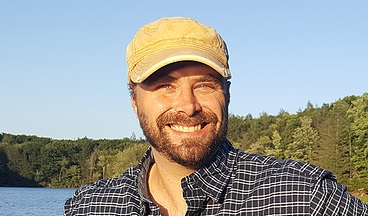Managing Editor Lisa Ampleman: As I looked over this Writers’ Day Jobs series recently, I realized that we were missing a particular kind of category: caregivers. Plenty of writers spend their days parenting or taking care of others. According to a 2015 study, more than forty million Americans “provided unpaid care to an adult or a child in the prior 12 months,” and others do so for a paycheck as well. Here we profile Ethan Chatagnier, a CR contributor (read an excerpt of his story “The Unplayable Études” from Issue 14.1 and his post for us on unplayable music) and Acre Books author, who spends part of his days taking care of his children:
How would you describe what you do for your day job?
There are two answers to that, really. I’m the stay-at-home dad for our family, so my days are a lot of tending to the kids, cooking, doing dishes, and otherwise keeping up the household. But I also work part-time for a test preparation company, tutoring and performing a few other roles.
What do you enjoy about those jobs, and what are some of their detractions?
It’s a privilege to be able to be so active in my kids’ lives. They’re really wonderful, and I think it’s good for them to have an at-home parent who’s available to them, and I don’t take it for granted. It’s also a lot of work, as so many parents have written about.
Once you have kids, your default state changes to “occupied.” Except for rare occasions of childcare, your time is not your own. It’s theirs, but you also have to split it with making dinner and cleaning it up and scrubbing toilets and all the unending tides of running a household. It’s such a weird mix of stressful and isolating at the same time that it’s wonderful and rewarding. It’s very hard to find time to, say, sit down and read a book for myself. But it’s easy to sit down and read a book to my kids. In the end, that’s lucky.
It’s complicated by adding in ten hours or so of work per week. That’s not a huge amount of working hours, but it feels like a lot when it’s competing with all the things I mentioned above. It’s competing with a lot of things for my attention, and it was a lot to manage during the pandemic specifically.
But I’m grateful that it’s remote and it’s fairly flexible in terms of when I can get it done. A part of the job I particularly love is answering emails from students having trouble solving math questions, and I get to just sit and untangle these tricky math questions and figure out how to explain them clearly, which turns out to be a strangely meditative thing.
How, if at all, do your day jobs inform—or relate to—your writing life?
The biggest thing they do is slow it down. That’s not really a complaint; it’s natural that writing has to take a backseat to my responsibilities to my family. Writing fits into my life in little bits and at great effort.
But I’ve also found some surprising ways it’s changed my process. When my kids were babies and I had literally no time to sit down and write, I found I could still develop ideas and storylines in my head while I was washing dishes, folding laundry, or doing other quiet work, and I could capture those developments in the notes on my phone. When I did get to drafting those stories, the writing was both easier and richer than the work I’d done before. This sort of predevelopment process is something I’ve stuck with even as I’ve progressed into slightly more forgiving stages of parenting.
What creative projects are you working on right now?
I’ve just finished finding a home for a novel, so I’m mulling which of several novels in progress I want to forge ahead with next. I’ll keep it vague, since it’s so uncertain, but some of the possibilities: unplayable music (may be familiar to Cincinnati Review readers!), a city with a shadowy history, and an American monarchy.
Ethan Chatagnier is the author of the novel Singer Distance (Tin House Books, Fall 2022) and the story collection Warnings from the Future (Acre Books, 2018). He lives in Fresno, California, with his family.











